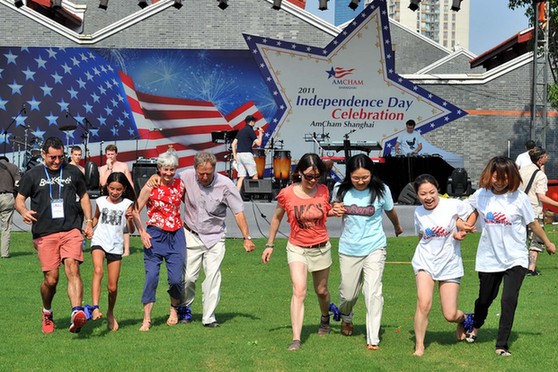Bureaus Exclusive
July 4 also milestone in US-Sino relations
By He Wei (China Daily Shanghai Bureau)
Updated: 2011-07-05 10:42
 |
Large Medium Small |
SHANGHAI - When Ted Hornbein first celebrated American Independence Day in China in the early 1990s, there were only a handful of people invited to the party at the US Embassy in Beijing.
On the guest list were a few reporters, several foreign student representatives, and one or two businessmen, he recalled. Western food and beverages for the celebration like McDonald's were take-away food from Hong Kong.

But for this year's July 4th, he no longer felt a lonely expatriate. As a board member on the American Chamber of Commerce in Shanghai (AmCham Shanghai), he and his colleagues organized the Independence Day celebration fair on Saturday for around 2,000 guests to share the joy of all Americans living and working in the city.
According to Hornbein, two decades have passed as the likes of him witnessed phenomenal changes on the Sino-US relations. "Today you have local and Western restaurants, your whole family here with you for the important holiday. Living here is so great that I have seen a 180 degree shift from my first July 4th party in China".
Beatrice Camp, US Consul General in Shanghai, echoed this view. As she completes her three years' diplomatic assignment in the country in the coming month, she expressed her gratification on the tangible progresses made by the two sides.
"I have been impressed, in my three years here, by how many areas of life we work together. Aside from politics and education, we have seen vibrant cooperation on pharmaceutical technology, security issues, agriculture, etc. There isn't any area that we don't work together," Camp told China Daily on Saturday.
More essential to a benign bilateral relationship is the increased people-to-people exchange, Camp noted. She told guests at the event that in 2011, a quarter of a million visas to the US are expected to be issued from the consulate in Shanghai.
And by this June, the visa section has witnessed a 40 percent year-on-year growth regarding the number of visas issued in the East China area, she said, adding that there is an ongoing plan to expand the consulate for more room to accommodate US visa applicants.
The private sector has always been a big momentum in maintaining relations on the right track. AmCham Shanghai, home to 3,500 members representing 1,700 American companies in China and the biggest such organization in Asia, makes a salient presence in the local community and represents a strong voice for the American business in China.
As the core of the US manufacturing and businesses in the country are heavily concentrated in Shanghai, the organization is keen to engage and enact dialogues between both governments, said David Basmajian, director of communications of AmCham Shanghai.
Among the many endeavors is the annual "Door-Knock" event, where AmCham Shanghai puts together its member representatives to lobby Capitol Hill, with reports handed over to decision-makers to "help narrow gaps and create understanding", Basmajian told China Daily.
"By sharing the experiences about how American companies operate in China, we are sending a message that having an American company doing business in China, or encouraging export to China, is good for the US economy and creates jobs," Basmajian said, "through this, we encourage the American government to devote more resources to help the companies enhance their competitiveness."
For instance, Hornbein runs his own company Richco Inc, a plastic manufacturer that have operations both in China and in Illinois, US. When they make products in China, some of the component parts have to come from the US, which generates job opportunities back home, Hornbein said.
The organization has been vocal for advocating China's entry into the World Trade Organization, and is influential in setting the agenda on some of the key consultation mechanisms between Washington and Beijing, notably the China-US Strategic and Economic Dialogue.
| 分享按鈕 |